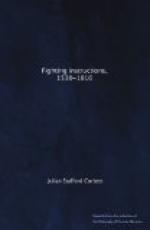The point is clearer still when we compare the different ways in which Nelson and Collingwood brought their respective columns into action. Collingwood in his Journal says that shortly before 11 o’clock, that is, an hour before getting into action, he signalled ‘for the lee division to form the larboard line of bearing.’ The effect and intention of this would be that each ship in his division would head on the shortest course to break the enemy’s line in all parts. It was the necessary signal for enabling him to carry out regularly Howe’s manoeuvre upon the enemy’s rear, and his object was declared for all to see.[37] Nelson, on the other hand, made no such signal, but held on in line ahead, giving no indication of whether he intended to perform the manoeuvre on the van or the centre, or whether he meant to cut the line in line ahead. Until they knew which it was to be, it was impossible for the enemy to take any step to concentrate with either division, and thus Nelson held them both immobile while Collingwood flung himself on his declared objective.
Nothing could be finer as a piece of subtle tactics. Nothing could be more daring as a well-judged risk. The risk was indeed enormous, perhaps the greatest ever taken at sea. Hawke risked much at Quiberon, and much was risked at the Nile. But both were sea-risks of the class to which our seamen were enured. At Trafalgar it was a pure battle-risk—a mad, perpendicular attack in which every recognised tactical card was in the enemy’s hand. But Nelson’s judgment was right. He knew his opponent’s lack of decision, he knew the individual shortcomings of the allied ships, and he knew he had only to throw dust, as he did, in their eyes for the wild scheme to succeed. As Jurien de la Graviere has most wisely said ’Le genie de Nelson c’est d’avoir compris notre faiblesse.’
Yet when all is said, when even full weight is given to the strategical pressure of the hour and the uncertainty of the weather, there still remains the unanswerable criticism of the officer of the Conqueror: that by an error of judgment Nelson spoilt his attack by unnecessary haste. The moral advantage of pushing home a bold attack before an enemy is formed is of course very great; but in this case the enemy had no intention of avoiding him, as they showed, and he




